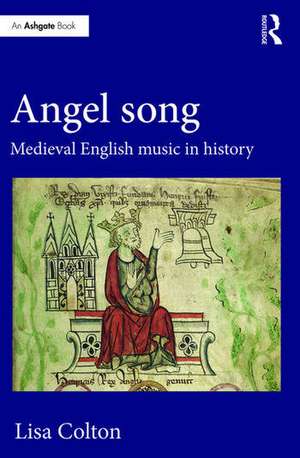Angel Song: Medieval English Music in History
Autor Lisa Coltonen Limba Engleză Hardback – 12 dec 2016
Preț: 821.13 lei
Preț vechi: 1103.49 lei
-26% Nou
Puncte Express: 1232
Preț estimativ în valută:
157.12€ • 164.51$ • 130.32£
157.12€ • 164.51$ • 130.32£
Carte tipărită la comandă
Livrare economică 10-24 aprilie
Preluare comenzi: 021 569.72.76
Specificații
ISBN-13: 9781472425683
ISBN-10: 1472425685
Pagini: 204
Ilustrații: 1 Line drawings, black and white; 6 Halftones, black and white; 1 Tables, black and white; 1 Illustrations, color
Dimensiuni: 156 x 234 x 14 mm
Greutate: 0.52 kg
Ediția:1
Editura: Taylor & Francis
Colecția Routledge
Locul publicării:Oxford, United Kingdom
ISBN-10: 1472425685
Pagini: 204
Ilustrații: 1 Line drawings, black and white; 6 Halftones, black and white; 1 Tables, black and white; 1 Illustrations, color
Dimensiuni: 156 x 234 x 14 mm
Greutate: 0.52 kg
Ediția:1
Editura: Taylor & Francis
Colecția Routledge
Locul publicării:Oxford, United Kingdom
Cuprins
Contents
Introduction ‘Merrie England’, Cultural Memory and the Writing of English Musical History
Chapter 1 ‘The greatest musical curiosity extant’: ‘Sumer is icumen in’ and the Canon of English music
Chapter 2 Anglicus angelicus: Was English Music Political?
Chapter 3 Authorship, Musicianship and Value in Medieval English History
Chapter 4 Who was John Dunstaple?
Chapter 5 Negotiating Identity in Medieval English Music: Anxiety and Ethnicity
Chapter 6 Contenance angloise: A Reappraisal
Epilogue
Introduction ‘Merrie England’, Cultural Memory and the Writing of English Musical History
Chapter 1 ‘The greatest musical curiosity extant’: ‘Sumer is icumen in’ and the Canon of English music
Chapter 2 Anglicus angelicus: Was English Music Political?
Chapter 3 Authorship, Musicianship and Value in Medieval English History
Chapter 4 Who was John Dunstaple?
Chapter 5 Negotiating Identity in Medieval English Music: Anxiety and Ethnicity
Chapter 6 Contenance angloise: A Reappraisal
Epilogue
Notă biografică
Lisa Colton is a Senior Lecturer in Music at the University of Huddersfield, where she is also director of the Centre for the Study of Music, Gender and Identity. Her research interests focus on early and contemporary music from historical, critical and analytical perspectives. Lisa Colton’s publications have included articles on medieval motets, manuscript sources, Judith Weir and Lady Gaga. She has co-edited two essay collections: Gender, Age and Musical Creativity (with Catherine Haworth), and Sources of Identity: Makers, owners and users of music sources before 1600 (with Tim Shephard).
Recenzii
"Angel Song offers a fresh perspective and a number of exciting new directions in both content and methodology. Colton’s research is meticulous and she makes interpretive arguments clearly and persuasively" — James Maiello, NABMSBA Reviews (North American British Music Studies Association)
"A masterful account of the medieval history of English music" —James Cook, Music and Letters, 2017
"Colton shows how a re-evaluation of primary source material can chip away at long-held assumptions about English music and medieval musical culture" — Samantha Blickhan, Early Music, 2018
"Angel Song is as much a book about the practice of musicology as it is about one specific musicological topic, and will prove to be an invaluable learning text for young scholars working on medieval sources, no matter what their provenance may be" — Samantha Blickhan, Early Music, 2018
"A masterful account of the medieval history of English music" —James Cook, Music and Letters, 2017
"Colton shows how a re-evaluation of primary source material can chip away at long-held assumptions about English music and medieval musical culture" — Samantha Blickhan, Early Music, 2018
"Angel Song is as much a book about the practice of musicology as it is about one specific musicological topic, and will prove to be an invaluable learning text for young scholars working on medieval sources, no matter what their provenance may be" — Samantha Blickhan, Early Music, 2018
Descriere
Angel song: Medieval English music in history examines the ways in which the standard narratives of English musical history have been crafted, from the Middle Ages to the present. Colton challenges the way in which the concept of a canon of English music has been built around a handful of pieces (notably ‘Sumer is icumen in’), composers (John Dunstaple), and practices (the contenance angloise), each of which offer opportunities for a reappraisal of English musical and devotional cultures between 1250 and 1460.
